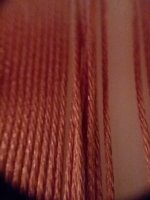nlancaster
Aluminum
- Joined
- Oct 8, 2018
Hello,
We have a part that is a glue up of ceramic and titanium.
We have always used a grounding clamp attached by a wire to the fixture.
This grounding wire frequently brakes after months of use where the wire is crimped into a wire eye for mounting with a 6-32 screw.
I have thought for a long time the problem is the size of the wire, making it too stiff which causes extra stress at the mounting lug.
I think the wire is 12gauge stranded copper.
I have never seen more then 70v at 3-4 amps during the cut, so I should be able to go to a much lower wire gauge right?
I was thinking from what I know about electricity we should be able to go down to 14-16 gauge wire without issues.
The wire itself is fully submerged during machining which should help keep it cool.
Any thought or tips on this?
We have a part that is a glue up of ceramic and titanium.
We have always used a grounding clamp attached by a wire to the fixture.
This grounding wire frequently brakes after months of use where the wire is crimped into a wire eye for mounting with a 6-32 screw.
I have thought for a long time the problem is the size of the wire, making it too stiff which causes extra stress at the mounting lug.
I think the wire is 12gauge stranded copper.
I have never seen more then 70v at 3-4 amps during the cut, so I should be able to go to a much lower wire gauge right?
I was thinking from what I know about electricity we should be able to go down to 14-16 gauge wire without issues.
The wire itself is fully submerged during machining which should help keep it cool.
Any thought or tips on this?



